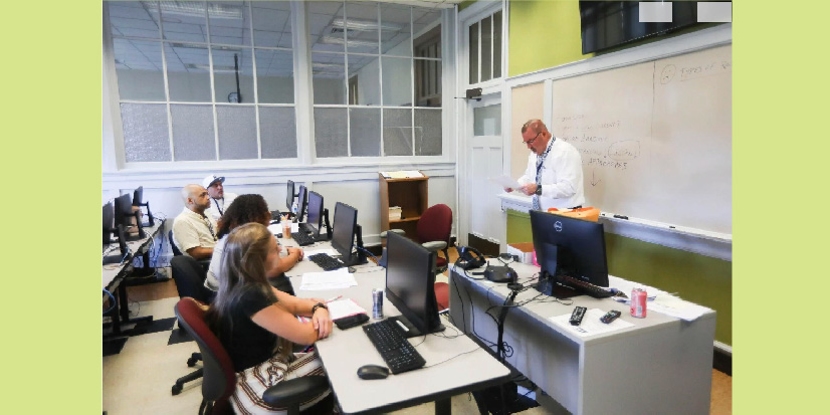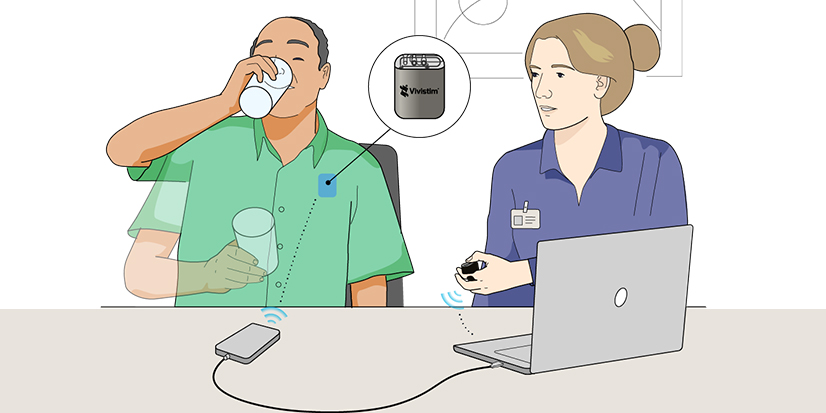Program promises career advancement for Allied Services direct support professionals
- Category: Media, Career News
- Posted On:
- Written By: Allied Services Integrated Health

REPOSTED FROM SCRANTON TIMES - BY JEFF HORVATH STAFF WRITER
SCRANTON — Patrick Quinn stood at the front of a small Lackawanna College classroom and delivered a lesson informed by four decades of serving people with intellectual disabilities.
“All behavior is meaningful,” he told the class of Allied Services Integrated Health System direct support professionals recently, emphasizing that difficult behaviors stem from unmet needs and the importance of knowing a person if you’re to help in a meaningful way.
Outside the classroom, Quinn’s students also serve clients with intellectual disabilities and autism, meaningful and often emotionally taxing work that can make a world of difference in clients’ lives. They were nominated for the class — a progressive new program promising career advancement, enhanced training and modest pay hikes — because they’re good at what they do.
“The first goal is simple: you’re rewarding people who are doing very good work,” said Quinn, Allied’s director of developmental services.
Nationally, however, fewer professionals are entering or staying in the field. Allied’s program, the product of a partnership with Lackawanna College, comes in response to the national workforce shortage driven largely by low wages and high turnover.
A 2022 compensation survey by the Center for Healthcare Solutions, the Arc of Pennsylvania and other collaborators illustrates the challenges many providers face. With 52 Pennsylvania organizations participating, including Allied, the survey put the average hourly wage for direct support professionals at $16.61, with a 28% vacancy factor and 38% turnover rate. Residential supervisors earn an average hourly wage of $22.20, but also experience a higher turnover rate at 42%, the survey found.
“This is a system that is severely strained past its breaking point,” Center for Healthcare Solutions President and CEO Nick Vizzoca said in a January press release announcing the survey. “There isn’t a single survey respondent that isn’t feeling the effects of this workforce shortage.”
In the interest of retention and career growth, Allied and Lackawanna are offering the 10-week course to roughly 17 of Allied’s full-time direct support professionals. Upon completion, they’ll earn a continuing education certificate jointly presented by both entities and a new job title, going from resident assistant I to resident assistant II at a pay increase of $1 an hour.
“This initiative will not only help with enhancing the training and development of our staff, it will financially reward our compassionate colleagues who care for our most vulnerable residents,” Allied Vice President of Community Services Bob Ames said in a statement.
It should also serve as a blueprint for similar programs in other sectors, Lackawanna College Director of Continuing Education Bill Schoen said, noting the strength of the college’s continuing education department is its ability to respond to employers’ needs.
“It’s easier to retain an employee than it is to recruit a new one,” he said. “It’s easier to retain a student than it is to recruit a new one. So this, we believe, will help with retention by giving people some extra skills to make them better on the job and to increase their worth to their employer.”
The program also aims to make better mentors out of participants, said Quinn, who developed the curriculum and teaches the course. He credited Ames and Allied Assistant Vice President for Developmental Services Mike Killeen with helping make the course a reality.
“This is another opportunity for retention by rewarding people who are really good at this craft and are really committed to taking care of people with intellectual disabilities,” Quinn said. “I think that the class members are getting a real appreciation for the unique personal histories and the struggles that our population have endured through the years, and that fight is not over.”
The course covers the history of intellectual and developmental disability care, from what Quinn calls the “dark ages” through the passage of key legislation that increased opportunities in education, community living and employment. It also covers practical and philosophic differences between past and current treatment practices and includes lessons in transformational leadership.
One recent lesson focused partly on the importance of listening, reading silent cues clients give and understanding that simple pleasures bring people joy. Quinn also stressed the significance of keeping promises.
Katie Kavulich, one of the direct support professionals participating in the class, said every client is unique. She and other participants, including Daniel Ramirez, said they do the work out of love and respect for the people they serve.
“You get to know them (and) see what makes one happy,” Kavulich said. “The more you get to know them and the more you engage, the more they’re doing. ... I knew there was more we could do but then, in a sense, I didn’t know how much more we could do until Pat (Quinn) explained the process of helping better their life.”
Many clients are nonverbal and face multiple developmental challenges. They’re often misunderstood, said Ramirez, who’s embracing the role of mentor to impart what he’s learning to colleagues in the interest of clients.
“I like this class because we can show the other person that’s coming in that this is the proper way,” Ramirez said.
Kavulich echoed that sentiment.
“We want them to follow in our footsteps and take the right approach,” she said.
Near the end of a recent session, Quinn described the work as “the most interesting thing you’ll ever do.”
Even if they eventually move on and pursue another profession, he told the class, they’ll never forget when they helped save a life and improve the quality of life for somebody with intellectual disabilities.
“We don’t get rich,” he said. “We do it because we love it.”
Resident Assistant Jobs at Allied Services
Allied Services Developmental Services Division has new opportunities - with new, increased pay rates - for Resident Assistants in Carbondale and Scranton. What is a Resident Assistant? Resident Assistants help to safely and gently provide complete assisted care for individuals with disabilities.
- Hear how one student discovered her capacity for caring as a Resident Assistant - read now.
- As an Allied Services employee, you'll enjoy great pay rates and benefits, flexible schedules AND no-cost college education!
- Learn more about Resident Assistant jobs - read now.


